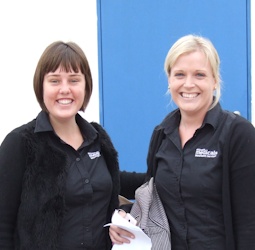Health checks run by VGC for staff across the country, as part of its commitment to health and safety, are encouraging staff to take responsibility for their health. One member of staff lost two stone in six months and feels “years younger”.
The VGC Group offers regular free confidential medical tests to staff at sites across the UK. A qualified nurse attends sites to run the checks, and invites people to make small changes that can help to make a big difference to their health and wellbeing.
One member of staff (who has asked to remain anonymous) has changed his lifestyle completely after his health check. “It was a bit of a shock when the nurse took my blood pressure,” he said. After discussing the results with his GP, he changed his eating habits and took up regular exercise – and has lost two stone so far. “I’ve made changes to what I eat, eating fruit and vegetables and cutting out pastries, and having porridge and fruit in the mornings instead of cooked breakfasts. And I cut down from three sugars in my tea to just half a teaspoon.” He has found that taking regular exercise as part of his martial arts hobby helps him to de-stress, and he says that he now feels years younger.
As a result of the feedback from the tests, VGC is putting in place an education campaign to help encourage staff to improve their lifestyles, including encouraging healthy eating and quitting smoking.
“People in the construction industry tend to have higher rates of occupational ill health,” said Ciara Pryce, group services director. “We want to ensure our people are fit and healthy, so they can continue working as long as they want to work, rather than only as long as they are able to work. Offering site visits in total confidence makes it easier and more convenient for people to talk to a health professional than they might find it to make an appointment and go along to their local GP.”
Following a health awareness day run on the Siemens Rail site in north Lincolnshire, Siemens Regional EHS&S Manager Paul Barker said: “The teams gave very positive feedback regarding the supply of occupational health specialists. It was something they really did seem to appreciate, because many of them find their working hours and location make it quite difficult to see their GP for routine checks.”
More health checks at other sites are planned during the forthcoming winter.
Areas covered by the health check depend on the needs of the person. Anyone found to be at risk of a problem like diabetes or high blood pressure (which increases the chances of stroke and cardiovascular disease), is given advice on making lifestyle changes to help reduce their risk. The health check includes:
- BMI – body mass index: a measure of whether someone is a healthy weight for their height. It is calculated by weight (in kg) divided by height (in metres) squared. People with a high BMI may have a higher risk of cardiovascular disease (heart disease, strokes), diabetes, arthritis and some forms of cancer. However, bodybuilders and full time athletes may have a higher BMI but very little body fat.
- Blood pressure: the force of the blood flow through the arteries. High blood pressure increases the risk of a heart attack or stroke.
- Cholesterol: high cholesterol can increase the risk of narrowing of the arteries, heart attack, stroke or mini-stroke.
- Blood sugar: too much glucose in the blood can cause serious health problems including diabetes.
- Advice on giving up smoking: smoking is one of the main causes of cancer in the UK. If current smoking trends continue, smoking will kill in the region of 1,000 million people in the 21st century.

